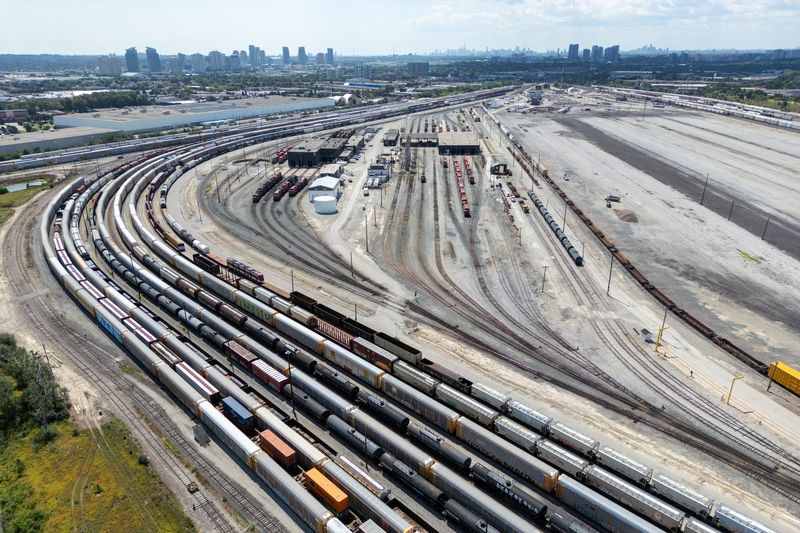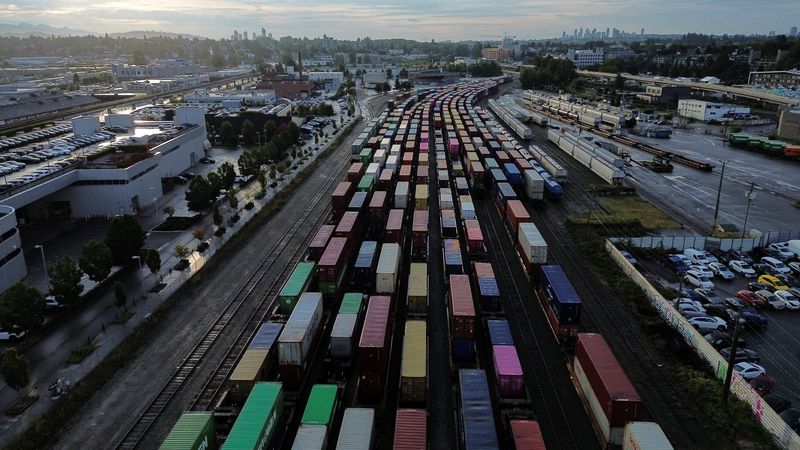By Promit Mukherjee
OTTAWA (Reuters) - Canada's economy could shrink by billions of dollars this year if a rail stoppage that began on Thursday continues for weeks, and the knock-on effects would swell jobless numbers and consumer prices, economists and analysts warned.
However, the economic impact could be minimal if the stoppage lasts less than a week, they said.
Canada's two biggest freight rail operators Canadian National Railway (TSX:CNR) and Canadian Pacific (NYSE:CP) Kansas City locked out workers affiliated with the Teamsters union on Thursday, after both companies and the union failed to conclude labor deals.
"If you have a stoppage that is extended, that drags out, that could be really devastating," said Pedro Antunes, chief economist at the Conference Board of Canada, an economic think-tank.
A two-week rail strike would result in a $3-billion loss in nominal GDP this year, and a four-week strike could lower GDP by nearly $10 billion in 2024, he said, adding it could result in 49,000 job losses in the year.
The unprecedented simultaneous stoppage of the majority of Canada's rail freight is "growth-negative and inflation-positive," said Robert Kavcic, senior economist with BMO Capital Markets.
Kavcic expects that the stoppage could shave around 0.1 percentage points each week from economic growth, "but the impact could build the longer it drags on," he warned. This translates into a weekly impact of over $2 billion in nominal GDP terms.
Canada's economic growth has been lackluster this year as consumers and businesses reeled under near 23-year-high interest rates before the Bank of Canada started trimming its policy rate in June.
After cutting interest rates in July for a second straight month, Governor Tiff Macklem hinted at shifting the bank's focus to boosting the economy rather than suppressing inflation.
First-quarter GDP growth was 1.7%, far below the bank's April forecast, and weakness in the economy made it scale down growth expectations this year to 1.2% from 1.5% in April.
Economists have said that rising unemployment, which hit a 30-month high last month, and a wave of around C$300 billion ($220.78 billion) in mortgage renewals next year, will keep economic conditions strained.
Amid all this, a protracted rail stoppage could lead to economic inertia, warned economists.
Derek Holt, head of capital markets economics at Scotiabank said that a one- to three-week strike could have a 0.1%-0.2% monthly drag on GDP, but its impact would rise exponentially with each passing day beyond three weeks.
The world's second-largest country by area, Canada relies heavily on CN and CPKC to ship grain, fertilizers and other commodities, along with manufactured goods such as chemicals and automobiles.
The total rail freight cargo hauled annually in Canada tops C$380 billion, with the vast majority moving on CN and CPKC's tracks.
Randall Bartlett, senior director of Canadian economics at Desjardins, said past rail stoppages have not usually continued beyond a week or 10 days.

"If it is short-lived like (in the) past, the impact is minimal," he said, adding a stoppage would do significant economic damage if it continues beyond a few weeks.
($1 = 1.3588 Canadian dollars)
